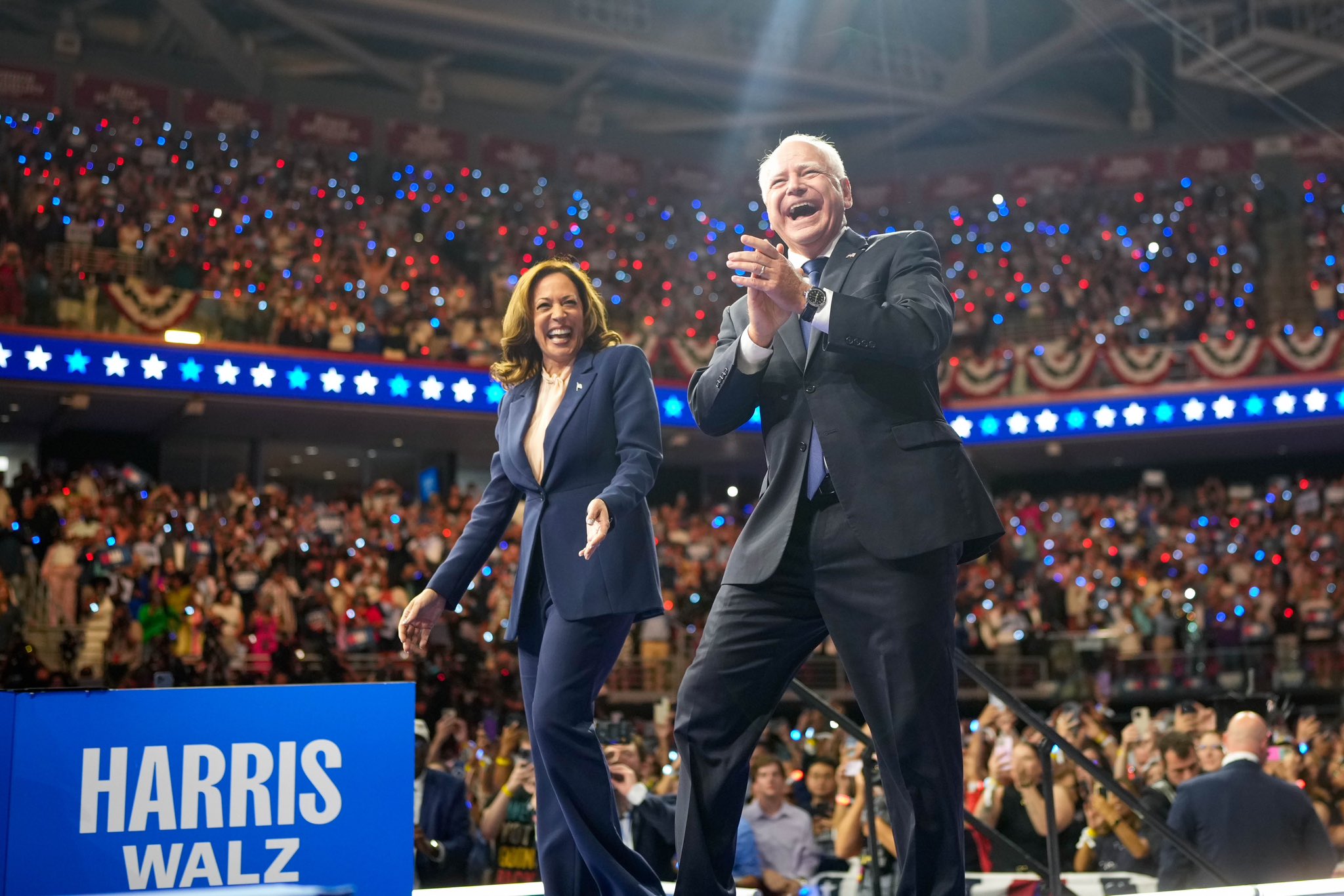By Dafydd Townley, University of Portsmouth; The Conversation

FILE: With Tim Walz by my side, and with all of you at our sides—let us fight for the promise of America’s future. (Photo: Kamala Harris/Facebook)
Hours after Kamala Harris announced her choice of running mate for November’s election, she and her vice-presidential pick, Minnesota governor Tim Walz were on stage at a rally of 12,000 people in Philadelphia. Turning his sights on Donald Trump and J.D. Vance, the schoolteacher and football coach turned politician gave a taste of the rhetorical style which is said to have won him his place on the ticket.
“Donald Trump sees the world a little differently than us,” he said. “First of all, he doesn’t know the first thing about service. He doesn’t have time for it because he’s too busy serving himself”. Putting the focus on Trump’s legal woes, he added: “Violent crime was up under Donald Trump … That’s not even counting the crimes he committed.”
Harris had announced Walz’s vice-presidential candidacy earlier in the day with an Instagram post in which she extolled his personal history and political achievements.
In a typical vitriolic attack, the Trump-Vance campaign immediately called Walz a “dangerously liberal extremist” and that he had spent much of his governorship “spreading California’s dangerously liberal agenda far and wide” – in a negative reference to Harris’s background as a Californian.
But, speaking to NBC news, former House speaker Nancy Pelosi countered this narrative, insisting that “to characterize [Walz] as left is so unreal. He’s right down the middle. He’s a heartland-of-America Democrat.”
Former US president, Barack Obama, released a statement saying that not only did Walz have “the values and the integrity to make us proud” but also “the experience to be vice president”.
As Obama insisted, Walz certainly has an extensive resume. A former high schoolteacher and football coach, who served in the National Guard for 24 years, he was elected to the US Congress in 2006 and won the governorship of Minnesota in 2018.
He says he governed on the principle that “you win elections to burn political capital and improve lives”. This meant policies such as legalising recreational marijuana and expanding background checks for prospective gun owners.
Harris pointed to Walz’s record of ensuring access to abortion rights in Minnesota as one of the outstanding features of his governorship. With the subject likely to be a key part of Harris’s campaign, this will underline the Democrats commitment to protecting those rights after the Supreme Court overturned Roe v Wade in 2022.
But it’s not just abortion rights where Walz would be a significant benefit to the Democrat’s campaign for the White House. Manish Bapna, president and CEO of the Natural Resources Defense Council (NRDC) Action Fund said the Harris-Walz partnership was “the winning ticket on climate”.
This is likely to increase his appeal to millennial and Gen Z voters. Walz has enacted some of the more progressive climate policies at state level, such as mandating zero-carbon electricity by 2040.
People I have spoken to in midwestern America have called Walz “a normal guy” that would relate to everyone from small business owners to veterans, from ethnic minorities to rural families, progressives to centrists to unions. The Harris-Walz ticket now has the sort of broad appeal that could prove crucial in gaining votes in those key “flyover” states, many of which traditionally lean to the Republican Party.
Changing the dynamic
The announcement of Walz as Harris’ running mate was accompanied with a considerable spike in reported fundraising by the Harris-Walz campaign. Harris is now reported to be outdoing the Trump campaign by a considerable margin.
It’s a completely different atmosphere to the stuttering Biden campaign of last month, when several high-profile donors were reported to have withdrawn their funding support.
Reid Hoffman, LinkedIn chairman and a major Harris donor, called Walz “a lifelong public servant who represents the best of our country”. Entrepreneur Mark Cuban, another big Harris donor, posted on X that Walz would appeal to those tired with ideologues who and want to vote for somebody they can relate to.
Walz attracted national media attention when he called Trump and Vance “weird” in an interview on MSNBC. The comment went viral and has become a label many online users have applied to Republicans.
There is a new vibrancy to the Democrat campaign, one which already has captured the attention of voters. Isaac Chandler, 30, from Oklahoma, told the BBC that the Harris-Walz partnership was “more representative of the wider American public than the Vance-Trump ticket”.
This is in stark contrast to the Republican campaign which has seemingly stalled after such a promising start. Less than a month ago, opinion poll surveys put Trump as much as five points ahead of any Democrat contender for the White House.
The attempted assassination of Trump gained further public support for the former president. It forced Democrats to rethink their strategy of identifying Trump as a threat to American democracy.
The Republican convention which followed appeared to be a coronation ceremony for the former president. And the announcement of Trump’s selection of Vance as his vice-presidential candidate was praised by many as an astute way of wooing working class voters.
Since then, however, the campaign has gone into free fall. Vance’s attack on Harris’s parenting skills and general comments on childless couples’ place in American society, coupled with Trump’s disastrous performance at a Q&A session with the National Association of Black Journalists, has had a disastrous impact on Trump’s polling.
If the Democratic campaign’s momentum can be maintained over the next couple of months, the recent swing in the polls in favour of Harris could prove to be even more significant and have an impact on the result in this November’s election.![]()
Dafydd Townley, Teaching Fellow in International Security, University of Portsmouth
This article is republished from The Conversation under a Creative Commons license. Read the original article.





















